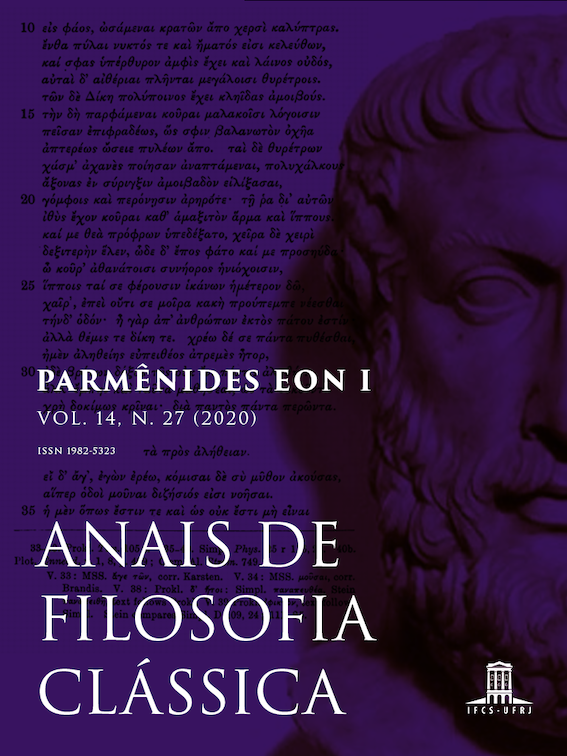Epistemological Relevance of Parmenides’ Ontology
DOI:
https://doi.org/10.47661/afcl.v14i27.38779Palavras-chave:
Being, Epistemology, God, Knowledge, Mortals, Name, Non-being, Ontology, Opinion, Rhetoric, Route, Sphere, Truth, Void.Resumo
It is possible to understand Parmenides’ being as the ‘totality of what exists’. Parmenides’ insight is that being is a compact continuum (fr. 4), and he gives a logical demonstration of this insight recognizing that non-being, which only could divide being in a plurality of beings, does not exist. Therefore, knowledge of being could only be the holistic appraisal of the totality of being – a form of knowledge unconceivable for men.Human knowledge is always articulated in concepts, images, relations…, expressed by their names. Men do not catch being itself, but, at best, some limited features of a minimal part of it, as they appear from human and personal perspectives. Thus, Parmenides’ calls mortals ‘two-headed’ who claim that their truths represent the reality of being, since their pretense would imply the existence both of being and of non-being. This epistemological conception is the only relevant result of Parmenides’ ontology. Parmenides’ epistemology solves many of the philosophical riddles of his time, it shows that the so-called Zeno’s paradoxes are sound arguments, and foreshadows the doctrines of Protagoras and Gorgias.
Downloads
Referências
ABRAHAM, W. E. “The Nature of Zeno’s Argument against Plurality in DK 29 B 1” Phronesis, 17, (1972) 40-52.
ALBERTELLI, P. Gli Eleati. Testimonianze e frammenti (Bari: Laterza, 1939).
BOOTH, N.B. “Were Zeno’s Arguments a Reply to Attacks upon Parmenides?” Phronesis, 2 (1957) 1-9.
BORGES, J.L. “Del rigor en la ciencia” in J.L. Borges, Tutte le opere (Milano: Mondadori, 1984) v. 1, 1252.
CALENDA, G. Epistemologia greca del VI e V secolo a.C.. Eraclito e gli Eleati (Roma: Aracne, 2011).
CALENDA, G. “Are Zeno’s arguments unsound paradoxes?” Peitho, 1 (2013) 129-130.
CALENDA, G. I cieli alla luce della ragione. Talete, Anassimandro, Anassimene (Roma: Aracne, 2015).
CALENDA, G. Un universo aperto. La cosmologia di Parmenide e la struttura della terra (Bologna: Diogene Multimedia, 2017).
CERRI, G. Parmenide di Elea. Poema sulla natura (Milano: Rizzoli, 1999).
CERRI, G. “Parmenide di Elea” in L. Ruggiu e C. Natali (eds.), Per una nuova lettura di Parmenide (Milano: Mimesis, 2011) 51-80.
CORDERO, N.L. “Les deux chemins de Parménide dans les fragments 6 et 7”, Phronesis 24 (1979) 1-32.
CORDERO, N.L. By being, It Is: the Thesis of Parmenides (Las Vegas: Parmenides Publishing, 2004).
COVOTTI, A. “Per Parm. VIII, 5 (Diels, Vors. I 2, 118)” Riv. di Fil. e Istr. Class. 36 (1908) 424-427.
CURD, P. The Legacy of Parmenides (Princeton: Princeton University, 1998).
DIELS, H. Parmenides Lehrgedicht (Berlin: Georg Reimer, 1897; Sankt Augustin: Akademia Verlag, 2003).
DIELS, H; KRANZ, W. Die Fragmente der Vorsokratiker (Zürich: Weidmann, 1951).
GALGANO, N. S. I precetti della dea. Non essere e contraddizione in Parmenide di Elea (Bologna: Diogene Multimedia, 2017).
GALLOP, D. Parmenides of Elea. Fragments (Toronto: University of Toronto Press, 1984).
GOEBEL, K. Vorsokratisch Philosophie (Bonn: Georgi, Universitats-Buchdruckerei und Verlag, Bonn, 1910).
HASPER, P.S. “Zeno Unlimited” Oxford Studies in Ancient Philosophy, 30 (2006) 49-85.
KIRK, G.S. Heraclitus. The Cosmic Fragments (Cambridge: Cambridge University Press, 1954).
KIRK, G.S; RAVEN, J.E; SCHOFIELD, M. The Presocratic Philosophers. (Cambridge: Cambridge University Press, 1983).
LEE, H.D.P. Zeno of Elea (Cambridge: Cambridge University Press, 1932).
MANSFELD, J. “Parménide et Héraclite avaient-ils une théorie de la perception?” Phronesis 41 (1999) 326-346.
MCKIRAHAN, R. D. Jr. Philosophy Before Socrates (Indianapolis: Hackett Publishing Co., 1994).
MOURELATOS, A.P.D. The Route of Parmenides (New Haven: Yale University Press, 1970).
MOURELATOS A.P.D; PULPITO, M. “Parmenides and the Principle of Sufficient Reason,” in M. Pulpito & P. Spangenberg (eds.) ὁδοὶ νοῆσαι. Essays in Honour of Nëstor-Luis Cordero (Bologna: Diogene Multimedia, 2018) 120-138.
NEHAMAS, A. “On Parmenides three Ways of Inquiry,” Deucalion 33/34 (1981) 97-111.
OWEN, G.E.L.“Eleatic Questions,” The Classical Quarterly, 10 (1960) 84-102; in R.E. Allen & D.J. Furley (eds.) Studies in Presocratic Philosophy (London: Routledge & Kegan Paul, 1975) 48-81.
OWEN, G.E.L. “Zeno and the Matematicians” Proceedings of the Aristotelian Society. N.S. 58 (1958) 199-222; in W.C. Salmon (ed.) Zeno’s Paradoxes (Indianapolis: Hackett, 2001) 139-163.
PRADEAU, J.-F. Héraclite. Fragments (Paris: Flammarion, 2002).
REALE, G; RUGGIU, L. Parmenide. Poema sulla natura (Milano: Rusconi, 1991).
REINHARDT, K. Parmenides und die Geschichte der griechischen Philosophie (Bonn: Cohen, 1916; 4th ed., Frankfurt am Main: Klostermann, 1985).
ROSSETTI, L. Un altro Parmenide (Bologna: Diogene Multimedia, 2017).
TARÁN, L. Parmenides (Princeton: Princeton University Press, 1965).
THOMSON, J. “Tasks and Super-Tasks,” Analysis, 15 (1955) 1-13.
UNTERSTEINER, M. Parmenide. Testimonianze e frammenti. (Firenze: La Nuova Italia,1958).
VIOLA, C. “Aux origines de la gnoséologie: réflexions sur le sens du fr. IV du poème de Parménide” in P. Aubenque (ed.), Études sur Parménide (Paris: Vrin, 1987) 2nd vol., 69-101.
Vlastos, G. “A Zenonian Argument Against Plurality” in J.P. Anton & G.L. Kustas (eds), Essays in Ancient Greek Philosophy (Albany: State University of New York Press, 1972) 119-144.
WITTGENSTEIN, L. Tractatus logico-philosophicus, (London: Routledge and Kegan Paul, 1961).
WOODBURY, L. “Parmenides on names”. Harvard Studies in Classical Philology 63 (1968) 145-169; in J.P. Anton & G.L. Kustas (eds.). Essays in Ancient Greek Philosophy (Albany: State University of New York Press, 1972) 145-162.


